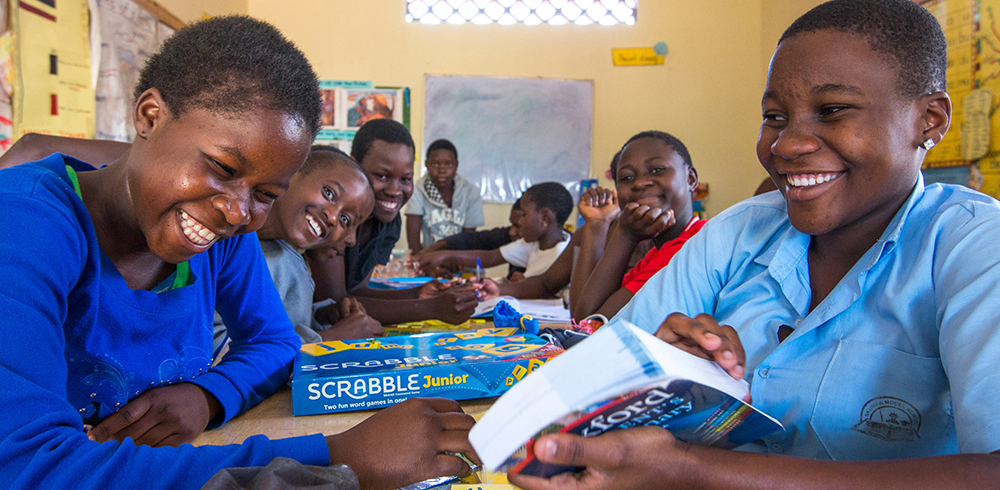
Programmes | Benefits for children | Viva’s added value
We believe strongly in the power of collective action. When organisations combine efforts, resources, expertise and people-power into one collaborative programme, they can reach far more children and make a deeper, more sustainable difference to their situation. As network members increasingly work together, we encourage them to initiate collective action programmes over and above their individual work.
Situations of children are complex so a single-faceted approach will not change them. If someone solves the situation for children in one city zone or one area of their life, the problem may well have worsened in another. Collective action enables complementary programmes with a cumulative effect from different angles.
Developing confidence and trust in the support of other network members, and learning to work together takes time. We initially suggest one-off collective action programmes such as Christmas Parties, which have an immediate impact on children, connecting them to the network and programmes of individual members and building the momentum of collective action. These then become an annual event to build relationship, reach new children and introduce new members to working together.
As network members benefit from positive experiences of working together their joint activity increases in scope and scale. These collaborative programmes are multi-faceted, designed around the multiple levels of children’s needs and contributing to achieving the network’s strategic focus to deliver deeper impact and widespread change for the situation facing the children.
Programmes that are currently being run by networks collectively include:
- COVID-19 response: Child and Family Mentoring Programme and more on Viva’s Children in Emergencies website
- Reaching Street Children
- Birth Registration
- Family Strengthening
- Child reintegration with families and alternative family-based care
- Preparation for Adult Life (Independent Living)
- Back to school programmes
- Girl mentoring
- Anti-trafficking
- Music and Media
- Disaster Risk Reduction
- Self-Esteem
- Children with Disabilities
- Children in Emergencies
More established networks who have gained traction in their cities are able to focus their coordinated response towards achieving a city-wide solution to a major problem facing children in their city. This will include working collectively with organisations outside the network group including government, corporate and larger NGOs and should produce complementary programmes with greater impact. You can read an introduction to solution themes here.
Benefits for children
Working collectively with a number of organisations has a significant impact on the children reached:
- Size and scale of programmes reach more children with better care (including new children not previously connected to members)
- The multi-dimensional method of the programme reach wider range of children’s needs and help to carers – too complex for a single organisations to tackle individually
- This greater expertise and capacity enables the network to look at prevention, rescue and restoration altogether as part of one coherent programme to work towards comprehensive solutions to changing the situation of children in the city.
- Working within the network enables a more comprehensive and joined up care of children so when a child moves from one project to another, the organisation should know the child’s context and details already, creating efficiencies in information exchange.
The success of collective action programmes rest on a strong and competent coordination team with clear understanding of vision, purpose and beneficiaries. As network members are living and working in the area and most aware of the needs of the children they are working with, and those they have yet to reach, it is important that they determine the focus and approach they need to take to tackle the most pressing needs of children. We support the development of issue-based action groups to involve all members in at least one collective action. Viva’s Network Development Team works closely with coordinators to help them to develop their strategy and method of implementation.
Once a focus has been agreed, Viva suggests a range of programme models that can employed and adapted. In cases where none of the programmes fit the need, we support the piloting of new ideas.
Larger programmes involve Viva fundraising and acting as the intermediary to help reduce administrative burden on the networks. In such instances, Viva’s technical programme support ensures good project management of effective delivery associated with all grants and investments, as well as reporting to donors.
All collective action programmes require good design, monitoring, evaluation and impact measurement. Programmes consider the scale, depth and cost of the intervention and we are supporting networks to more effectively consider ‘outcomes’ rather than just outputs. Where necessary we encourage networks to identify specialists or expertise that can help ensure that plans follow best practice and optimise the degree of change that can delivered with the resources available. We then work with the networks to identify good qualitative and quantitative measurement tools to ensure that programme effectivity, learning and impact can be evidenced.
As networks begin to work on larger programmes, it can become difficult to maintain a good balance between collective action and network development. Viva’s Network Development Team continues to coach coordinators and work with Steering Groups to help them to keep the wider network focused and engaged, whilst always trying to attract new members.
Ultimately, in order to change the situation for children across the cities, we help envision the networks toward larger ‘solution’ programmes, which require collaboration beyond the immediate network to work with civil society and city authorities and engage with government initiatives seeking funding to secure long-term sustainable outcomes.
Resources on the global situation of children
- Save the Children (2019) Changing Lives in our lifetime
